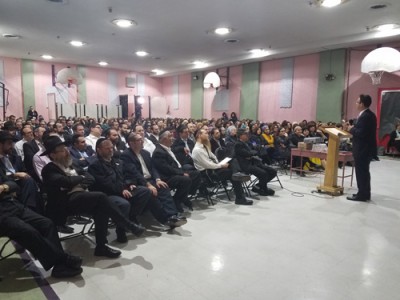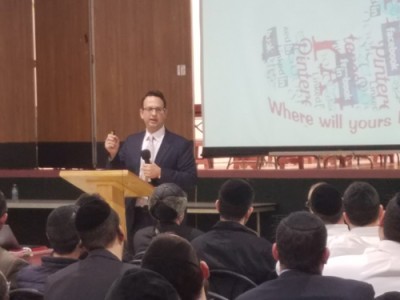

On Monday evening, November 6, a large crowd of parents gathered at the Bais Yaakov Academy of Queens for an informative and timely lecture on technology awareness and digital citizenship. Rabbi Mordechai Gewirtz, the school’s dean, greeted the crowd.
Dr. Eli Shapiro opened the evening by explaining that his lecture was about “digital citizenship,” which is a buzzword describing a regular user of the Internet. His warm and humorous presentation engaged the audience. He offered practical, hands-on tips to help parents manage the challenges of both our own use of technology and our children’s use of technology.
He showed a short video depicting technology in 1984. It was fascinating to see how far we have come from dial-up connections and experimental use of the Internet to where we are today. Dr. Shapiro stressed that technology is a part of our lives that is not only here to stay, but is constantly advancing at an incredible rate. Although most of us would love to have a magical filter to protect our families from the negative side of technology, we know that none exists. Our children are the first generation growing up in this environment. He compared our generation of parents to the immigrant parents in the 1920s who came to America not knowing English or American culture, while their children grew up with it. Used properly, technology can enhance our lives.
Dr. Shapiro then focused on the impact of technology on society. It affects us socially, behaviorally, psychologically, and in day-to-day life. He then described some of the challenges that technology presents to us, and even more so, to our children.
Social media is widely used, both between friends and among families. While it can help keep friends and family in close contact, social media can also promote negativity. For every positive hashtag used to file things in social media, there were two negative ones. Dr. Shapiro noted that 75 percent of children in day schools and yeshivos are engaged with social media.
Technology can also cause behavioral issues, such as dependence, distraction, and impulsivity. Children are naturally more impulsive than adults, so they have more trouble controlling themselves with it. Dr. Shapiro elaborated that when children do not have control over their own behavior, this has a negative impact on their self-esteem. He noted that there is more depression and anxiety in children today, and some of this can be attributed to their use of technology.
There is also the possibility of miscommunication. A study concluded that one out of three students and half of adults had texted or emailed something they regretted. Additionally, a lot of cyber bullying has emerged from miscommunication online. We must always think carefully before sending out a text message or email, and must stress this to our children as well. This is made more difficult since technology causes impulsivity and “dis-inhibition.”
Another issue is the disruption of sleep caused by cell phones. Dr. Shapiro pointed out that 82 percent of children sleep with their cell phone in reach. Both the light from the phone, as well as the temptation to stay up late using it, have a negative impact on getting a good night’s sleep, which is crucial for children in order to be productive and do well in school. A study done in June showed that children with their phone in proximity had reduced cognitive functioning even though they were not touching the phone. Other studies have shown that taking a break from the use of cell phones and technology can have a positive impact on children, socially and cognitively.
Dr. Shapiro also touched on the topics of inappropriate websites causing emotional distress in children and “digital footprints.” He shared that children need to know that everything on the computer is traceable and can impact their future lives in ways that they can’t even imagine.
As parents, we need to focus on how to communicate with our children about technology use. We need to be familiar with their devices and what they are putting on them. He recommended Apple devices, because it is easiest to place restrictions on them. He shared a sample contract that he made with his daughter for technology use, which included a schedule for when all apps disappear for homework time and bedtime. He also stated that we must model appropriate digital citizenship. Are we always in front of a screen or on the phone? This sends a message to our children. We must be able to communicate our concerns with our children and set clear rules, such as no technology use behind closed doors, during dinner time, and bedtime. Of course, our relationships with our children will be the key to success in this. It is also important to communicate with the parents of your child’s peers so that everyone is on the same page, and you don’t have to accept it as true when your child says, “Everyone does…” or “Everyone’s parents let them…”
Dr. Shapiro’s lecture was eye-opening and well-received. May Hashem bless us with the help we need to protect our children from the potential harms of technology.
Eye-Opening Digital Citizenship Awareness Program Held In Kew Gardens
Typography
- Smaller Small Medium Big Bigger
- Default Helvetica Segoe Georgia Times
- Reading Mode


